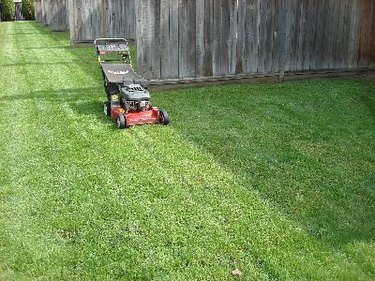
Bermuda grass is a popular turf species for lawns and sports fields throughout the southern United States. Bermuda grass is a vigorous, sod-forming perennial that can spread with seeds, stolons and rhizomes. It prefers daytime temperatures between 95 and 100 degrees Fahrenheit and will suffer if temperatures fall below 30 degrees Fahrenheit. Bermuda grass is also known for an ability to tolerate saline conditions as well as both acidic and alkaline soils but performs best withing a certain pH range. Properly applied lime may be used to raise the pH of acidic soils.
Determing if Lime Is Necessary
Video of the Day
Getting soil tested is necessary to determine whether or not lime is necessary and how much should be used. According to Richard L. Duble, a turfgrass specialist with the Texas Cooperative Extension, Bermuda grass is tolerant of a broad soil pH range. However, it performs optimally if the pH is between 6.5 and 8. Soils with a pH below 6.5 should be treated with limestone according to test result recommendations.
Video of the Day
Spring Fertilization
Lime should only be applied if a soil sample analysis suggests adding lime to raise the soil pH. It may not be necessary to apply lime annually. The lime can be applied about three weeks after the lawn completely greens up for the season. Although the dates of green-up vary between locations, lawns in South Carolina are typically ready to be treated with lime in mid-spring.
Before Planting
Lime can be applied before seeding a new lawn or field. If a soil sample analysis finds that the pH should be raised for optimal growth, supply the lime necessary to raise soil pH to within the desired range for Bermuda grass. Fertilizer and lime can be broadcast over the field and incorporated into other seedbed-preparing tillage operations.
Problems With Excess Lime
Although Bermuda grass lawns will likely not immediately suffer if too much lime is added, possible long-term effects should be taken into consideration. Over-liming will raise the soil pH and increase levels of calcium and magnesium. A high pH can tie up phosphates and elements like boron, iron, copper, manganese and zinc.